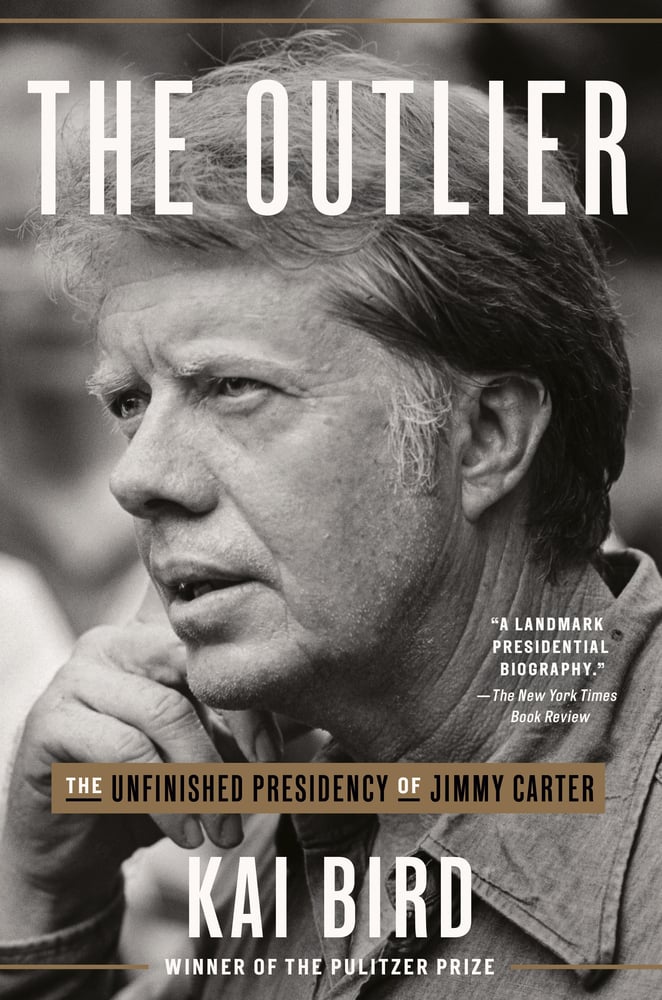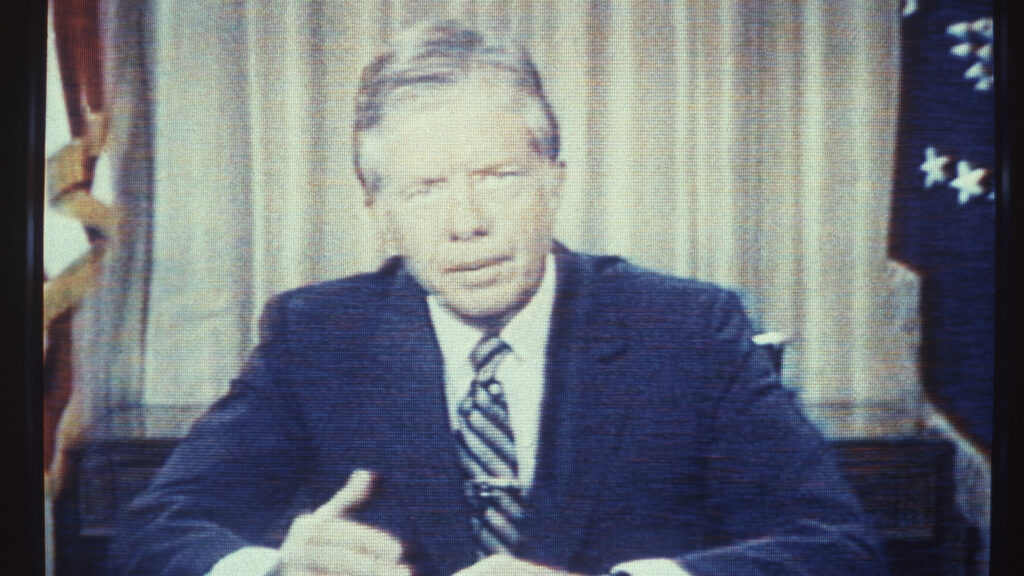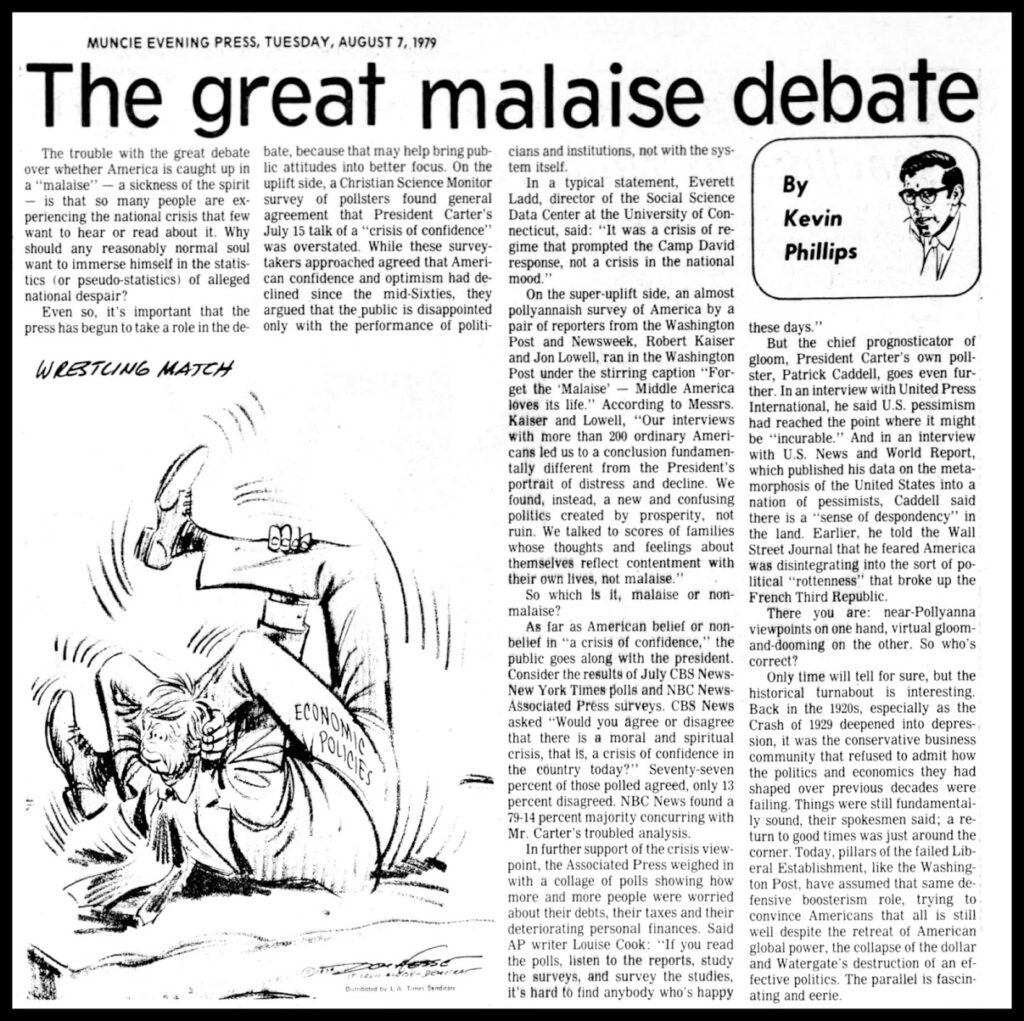The presidential historian Robert Dallek, author of books on Franklin Roosevelt, John Kennedy and Lyndon Johnson, among others, contends that it takes decades after any president leaves office to begin to assess their historical importance.
With his death on December 29 at age 100, and with Jimmy Carter having been out of office for more than 40 years, his White House tenure is ripe for reassessment, and we’ve seen plenty of that this week.
Carter’s is a complicated legacy, and making his presidential assessment even more difficult is the near universal acknowledgment that Carter was the best “former president” ever.
Two recent biographies by Jonathan Alter and Kai Bird reassess Carter as a much underappreciated president. Bird’s assessment that Carter’s “presidency was ahead of his times” is persuasive given his emphasis on human rights as a cornerstone of American foreign policy, his environmental leadership – he placed solar panels on the White House roof which Ronald Reagan later removed – and his dedication to an anti-imperial presidency.

Yet, much like Joe Biden, Carter stumbled badly in understanding the power of inflation to inflame voter resentment, and Carter’s prickly tendency to present himself as the smartest guy in every room turned off many, including fellow Democrats.
Like all presidents, perhaps save the one about to return to the White House, Jimmy Carter was a complicated guy, a rock and roll fan who taught Sunday school for 40 years, a devoted husband who admitted to lust in his heart, a nuclear submariner who spoke constantly of peace.
Yet, who among us is without contradictions, so I come to praise the late president as perhaps the most genuinely decent man to ever hold the job and one who was right on many big issues.
Most of the Carter obituaries, maybe not surprisingly, have omitted Carter’s role (and that of his Interior Secretary Cecil Andrus) in pulling off what is arguably the greatest single piece of conservation legislation ever – the Alaska National Interest Lands Conservation Act.
The unsurprising part of the Alaska omission reflects the reality that all national politics are Washington-centric. Being a great conservation president who mastered the details of legitimate Native American claims to The Last Frontier and measured them against what Andrus called “the rape, ruin and run crowd” was lost on most political obit writers.
Still, that law, signed by Carter on December 2, 1980, nearly a month after he lost the presidency to Ronald Reagan, more than doubled the size of the national park system, while creating wildlife refuges, national monuments and preserves. It was a truly historic achievement ranking Carter with Teddy Roosevelt as a visionary in protecting American land for generations far into the future.
The New York Times printed the Alaska story on page A20.
What the obits have not omitted is the so called “malaise speech,” a televised address Carter delivered from the Oval Office on July 15, 1979. Carter titled the speech “A Crisis of Confidence,” and the word malaise was never used.
Nonetheless, the speech has taken on outsized influence as a kind of shorthand for Carter’s “weakness” as a president or, for some, televised evidence of his off putting preachiness. Carter biographer Jonathan Alter saw the speech differently, and I agree, as “the most curious, confessional, and intensely moral television address ever delivered by an American president.”
Knowing that many writing now about Carter’s legacy simply don’t have memories of his presidential period, or even more likely have accepted the conventional wisdom that the speech is evidence of some huge political miscalculation, I decided to go back this week and re-read that speech.
Viewed through the lens of the pending return of Donald Trump to the presidency – Carter called Trump a “disaster” during his first term – the 1979 speech was both a warning and a plea.
While the speech from a policy standpoint was about energy it was really about values and responsibility. Carter spoke of a “crisis of confidence,” and called for individual citizens to rededicate themselves to the nation’s enduring ideals.
“The erosion of our confidence in the future is threatening to destroy the social and the political fabric of America,” Carter said. Remember that was 45 years ago.
“The confidence that we have always had as a people is not simply some romantic dream or a proverb in a dusty book that we read just on the Fourth of July.
“It is the idea which founded our nation and has guided our development as a people. Confidence in the future has supported everything else – public institutions and private enterprise, our own families, and the very Constitution of the United States. Confidence has defined our course and has served as a link between generations. We’ve always believed in something called progress. We’ve always had a faith that the days of our children would be better than our own.”
And then this:
“We always believed that we were part of a great movement of humanity itself called democracy, involved in the search for freedom, and that belief has always strengthened us in our purpose. But just as we are losing our confidence in the future, we are also beginning to close the door on our past.
“In a nation that was proud of hard work, strong families, close-knit communities, and our faith in God, too many of us now tend to worship self-indulgence and consumption. Human identity is no longer defined by what one does, but by what one owns. But we’ve discovered that owning things and consuming things does not satisfy our longing for meaning. We’ve learned that piling up material goods cannot fill the emptiness of lives which have no confidence or purpose.”
Those were not the words of a weak president, but a moral one, and given where we sit today a prophetic one.

“As you know, there is a growing disrespect for government and for churches and for schools, the news media, and other institutions. This is not a message of happiness or reassurance, but it is the truth and it is a warning.”
In the best tradition of political leadership, Carter called for individual Americans to buck up, take more responsibility, and believe in themselves and the country.
“First of all, we must face the truth, and then we can change our course. We simply must have faith in each other, faith in our ability to govern ourselves, and faith in the future of this nation. Restoring that faith and that confidence to America is now the most important task we face. It is a true challenge of this generation of Americans.”
Given that Americans have again chosen Trump, a profoundly flawed man who has done more than anyone in our lifetimes to denigrate American institutions, while basing his fundamental appeal on division and the worst instincts of his supporters, Carter’s plea in 1979 could well be made today. It remains profoundly relevant.
“All the traditions of our past, all the lessons of our heritage, all the promises of our future point to another path, the path of common purpose and the restoration of American values. That path leads to true freedom for our nation and ourselves.”
By the time Carter gave his most famous speech his approval ratings were in the dumpster, inflation was running high and political change was in the air. The man who made Carter a one-term president, Ronald Reagan, dismissed the speech saying he didn’t see anything wrong with America or Americans. And that explains a lot about The Gipper and his nearly infallible sense of what a politically advantageous position looked and sounded like.
Reagan would later declare it “morning in America,” a country that was a shining city on a hill, but which man, given where we find ourselves, had a better grasp on the “real America?”

Carter, as close to a 20th Renaissance Man as has ever occupied the White House, was really calling, Lincoln-like, for our better angels to assert themselves. That they did not was, at least not entirely, his fault – “The fault dear Brutus,” as Shakespeare wrote, “is not in our stars but in ourselves.”
Carter understood, certainly understood better than most who found his presidency wanting, that all great nations, as Arthur Schlesinger, Jr. would later write in The Cycles of American History, undergo “patterns of alternation, of ebb and flow, in human history.”
We are in the midst of one of Schlesinger’s cycles right now – an ebbing of faith in democracy – a cycle of immense division where character and competence in public officials counts less than their ability to keep us riled up, anxious about our place, and hating someone or something. The rightwing denigration of democratic institutions, the utter disdain for “elitist” expertise, is now the defining characteristic of our time. The threat this presents to the country is surely in keeping with the central warning of Jimmy Carter’s much maligned speech.
If Carter’s message of the need for unity and sacrifice and coming together was too much for Americans to absorb in 1979 it could just be that the timing of his departure was close to perfect. We’re reflecting on Carter’s good and productive life, and his lifelong striving to do good, while waiting – again – for a man with vastly different inclinations.
Carter’s life – and his “malaise speech” – remind us what’s at stake when we trust our government, and indeed our future, to genuinely unserious, hateful and petty people.
The next months will tell us just how unserious we have become. Jimmy Carter, one might say, saw it all coming a long time ago.
—–0—–
One more thing …
E. Jean Carroll: Affirmed!
Jimmy Carter, the Sunday school teaching evangelical who made it a personal cause late in his life to build homes for needy Americans and battle against deadly tropical diseases affecting some of the world’s poorest people, died within hours of a U.S. Appeals Court affirming the guilty verdict of the incoming president.
As the Second Circuit Court of Appeals wrote, “after a nine-day trial, a jury found that plaintiff-appellee E. Jean Carroll was sexually abused by defendant-appellant Donald J. Trump at the Bergdorf Goodman department store in Manhattan in 1996. The jury also found that Mr. Trump defamed her in statements he made in 2022. The jury awarded Ms. Carroll a total of $5 million in compensatory and punitive damages.”
If you care to you can read an excellent summary of the ruling regarding the once and future president by former federal prosecutor Joyce Vance.
Or, in the alternative, you can just marvel that this is happening in the United States of America.
Happy New Year. And all the best.
